Choosing an orthopedic mattress: the main factors
For a restful and deep sleep, the position of the body must be comfortable. The function of the mattress is to provide support for the spine and to ensure the correct position of the body. But, in addition, a person should be comfortable in a dream - the body should not be compressed, the skin should breathe, the springs should not creak, etc. These two main factors should be guided by when buying a mattress.
- Support. The ability of the anatomical mattress to bend by an amount corresponding to the weight ensures the correct position of the spine, since under heavier parts of the body the mattress sags more, under lighter parts - less. The higher the rigidity, the less pronounced this ability, therefore it is very important to choose a mattress of the correct rigidity. It is best to consult an orthopedic surgeon about this in order to assess the condition of the skeletal system and the level of support you need.
- Comfort. It is not enough to ensure the correct position of the body, it is also necessary that it be comfortable for the person himself, so that certain parts of the body do not "numb", the mattress does not press anywhere. Moreover, the materials from which it is made must allow air and water vapor to pass through so as not to sweat during sleep.

In addition to these two factors, pay attention to other features of orthopedic mattresses that are equally important:
- Hygiene. The mattress must be well ventilated, this is important to maintain optimal temperature and body moisture during sleep. Some manufacturers report having an elaborate ventilation system. Pay attention to the covering layer, it can be universal or designed for a certain time of the year. Some of the mattresses are "versatile" - the flooring material on the one hand is designed for the winter, it is made of wool, and on the other - for the summer, made of cotton.
- Hypoallergenic. It is good if the mattress is made of environmentally friendly materials, in this case it will not release substances into the air, which may develop allergies. This factor influences the choice of an orthopedic mattress, especially if it is intended for a small child or elderly person.
- Deformation transfer. If two people sleep on a bed, the ability of the mattress to transmit deformation becomes essential. When one person gets out of bed, the other's sleep should not be disturbed. Blocks of dependent springs are distinguished by a high degree of deformation transfer.
- Edge stability. The edges of the mattress are a "weak" place, they are easily deformed, most often this happens if you have a habit of sitting on the edge or sleeping close to the edge of the bed. Good manufacturers additionally reinforce the edges with a polyurethane foam or steel bar frame.
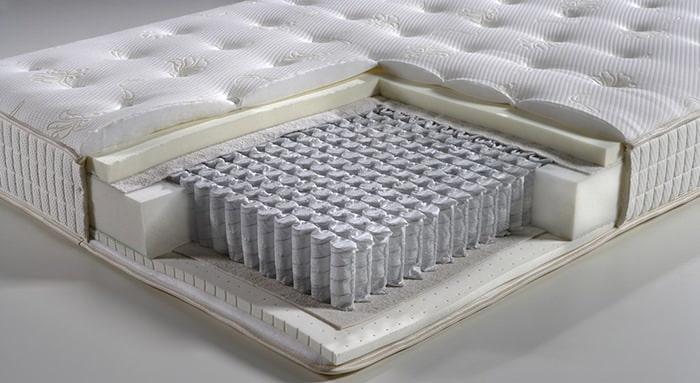
Stiffness of orthopedic mattresses
The quality and degree of spine support is determined by the firmness of the mattress you will sleep on. There are three groups of stiffness with different purposes:
- Soft. These mattresses are designed for people with low weight, as well as for the elderly. They are not suitable for those whose bone skeleton is just forming.
- Semi-rigid. Medium hardness is suitable for most healthy people.
- Tough. Mattresses are intended for children and young people who have not completed the formation of the skeletal system. People with very large weight, especially those who are obese, are not recommended to sleep on such.
How to choose an orthopedic mattress that is right for you in terms of firmness? To do this, you need to lie on it. It is better if someone looks at you and determines how level you are lying, whether your spine is straight.
- Norm. The mattress of the "correct" rigidity takes the shape of the body, as a result the spine forms a straight line parallel to the floor. In this position, the muscles relax, the body fully rests in a dream.
- Softer than necessary. If the spine bends, there is a feeling of a "hammock" - the mattress is too soft, after a night spent on it, your back may ache.
- Harder than necessary. The line of the shoulders and hips appears to be raised. This means that the mattress is too hard, the body will "press" against it, disrupting the normal circulation of blood and lymph. In the morning, swelling is possible, as well as a feeling of "numb" neck, legs, arms.
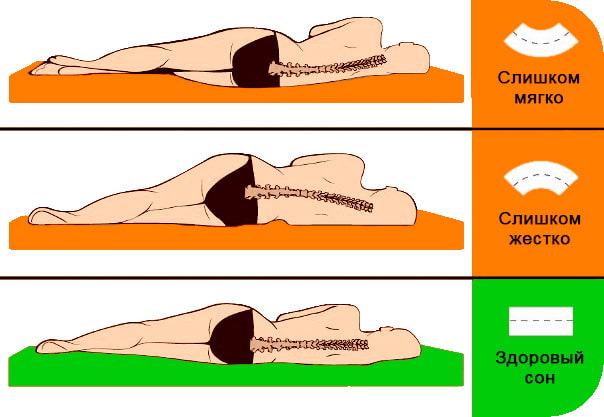
Another selection criterion is weight.
- Up to 60 kg - low rigidity
- 60 - 90 kg - medium hardness
- Over 90 kg - high rigidity
We are talking only about healthy middle-aged people.
Advice: To check whether you made the right choice or not, lie on your back. Slip your palm under your lower back. Is it free? The mattress is too hard. Turn from side to side. Difficult? The mattress is too soft.
Comfort level
Comfort is a special feeling, it is not always possible to understand how it is achieved. In the case of a mattress, this is easy to determine: if it presses on the protruding parts of the body, for example, the hips and shoulders, when you lie on your side, it means that it will be uncomfortable to sleep. The larger the area that the body is in contact with the mattress, the less pressure is felt, since the weight is more evenly distributed.
When deciding which orthopedic mattress to choose, it is better to focus on artificial and natural latex and memory foam, they provide the most comfortable sleeping conditions. If you are an adherent of spring mattresses, choose the one in which the number of spring blocks per unit area is greater - the distribution of the load in it will be more even.
Types of orthopedic mattresses
There are two types of mattresses that provide proper back support.
- Spring loaded
- Springless
In mattresses of the first type, springs are used as filler. They can differ in the steel from which they are made, in the number of turns and also in the method of fastening - to be connected with each other or independent. Mattresses of the second type have sheets of elastic material or a combination of sheets of different materials differing in density and elasticity as a filling. Both types come in all degrees of severity and can provide adequate sleep comfort.
Spring types of orthopedic mattresses, in turn, are divided into two types:
- Dependents. The double-cone springs are stacked in rows and interlocked. The main advantage is the low price. They are characterized by a short service life (no more than 7 years). The orthopedic effect is rather weak. Not recommended for use by people with a large weight (over 100 kg), as well as married couples with very different weights.
- Independent. Each spring is housed in a separate case. The springs are connected into a single block by stitching the covers. Such mattresses are more expensive, but last longer - up to 10 years. The orthopedic effect is quite pronounced.
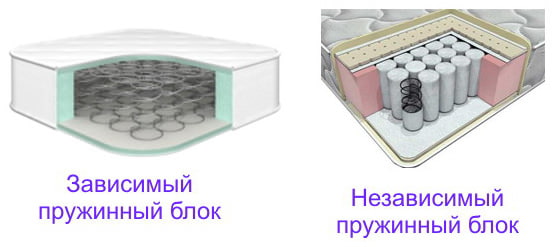
The main indicator of the quality of spring models is the distribution density of blocks, measured in units per square meter. Indicator 200 is the minimum for high-quality models. In addition, the springs can vary in size and are distributed in different ways in the mattress. In accordance with this, several groups are distinguished:
- Pocket Spring (TFK, S-500). The most budgetary option for an independent spring block. The springs have a diameter of about 6 cm, their distribution density is 220 - 300, the permissible load is up to 120 kg per berth.
- Multipocket (S-1000). The diameter of the springs is slightly smaller - about 4 cm, and the number is larger (density 500). Withstands up to 130 kg per bed. Provides better orthopedic support and greater comfort than Pocket Spring.
- Micropocket (S-2000). The diameter of each spring is 2 - 2.6 cm, the density is 1200. Such a mattress is less springy than others, and is very elastic, which increases the comfort of sleep.
- Hour Glass. Another name is an hourglass. The springs are made in an unusual hourglass-like shape, which ensures optimal rigidity. The main advantage is that they are suitable for people of any weight.
- Dual Spring. Special properties of the orthopedic mattress are provided by double springs, they allow people with a weight of forty kilograms to sleep comfortably on the bed. The maximum weight of one partner is 150 kg.
- Reinforced. For the manufacture of springs in such mattresses, wire of increased diameter is used. The blocks themselves are installed alternately, in a "checkerboard" order.
- Stiffness zones. Installation of springs of different stiffness in different zones of the mattress allows you to more evenly distribute the load and provide convenience for people of different builds. There are three, five and seven-zonal mattresses. Also, the mattress can be divided into two berths with different degrees of rigidity for partners with very different weights.
Fillers for orthopedic mattresses
Springless mattresses are made from various materials, both natural and artificial. In particular, exotic fillers such as sisal or horsehair can be used. Let's take a closer look at the most popular options, their pros and cons.
PPU
Foam made of synthetic polyurethane foam. It also has other names (foam rubber, ortofom).
Pros: Low cost, availability.
Minuses: Poor air and moisture permeability, short service life, can accumulate odors and retain them for a long time.
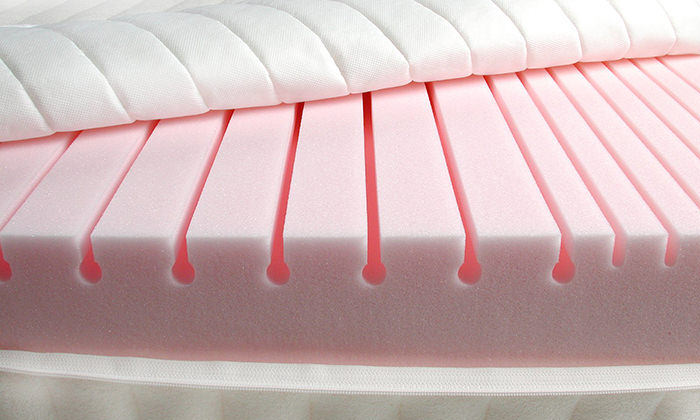
Memoriform
Modified polyurethane foam with memory effect. Trade names Memory Foam, Memorix.
Pros: After removing the load, it returns to its original shape. Less pressure on the body, facilitating better movement of blood and lymph in the body.
Minuses: Poor air permeability.
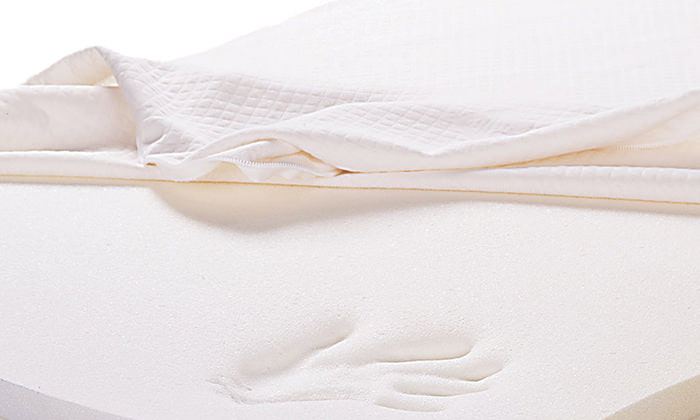
Latex
Foam obtained from the sap of the Hevea tree (a genus of palm trees).
Pros: Completely natural and very environmentally friendly material. Easily changes shape under pressure, gently "hugs" a lying person, provides comfort and proper thermoregulation. Does not absorb odors and moisture. The service life is up to 20 years.
Minuses: The only drawback is the high price, which, however, pays off with a long service life.
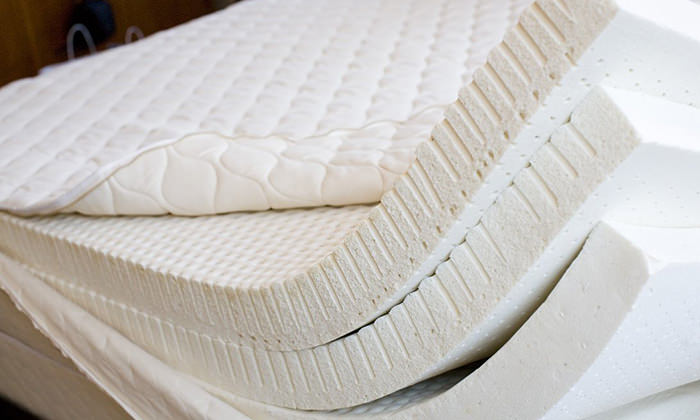
Artificial latex
Manufactured from specially processed polyurethane foam.
Pros: Of the popular materials for orthopedic mattresses, this one can be considered optimal in terms of price-quality ratio. Withstands a lot of weight.
Minuses: The service life of such mattresses does not exceed 15 years.
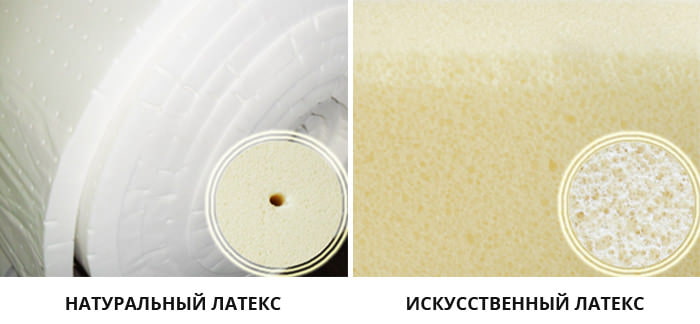
Coira
This material is obtained from fibers obtained from the intercarp of coconuts. Completely natural material with high elasticity. Each coir hair can be viewed as a mini-spring.
Pros: Resistant to moisture, microbes and mold do not start in it, the material does not rot.
Minuses: Quite hard material that needs to be combined with softer ones for comfortable rest.
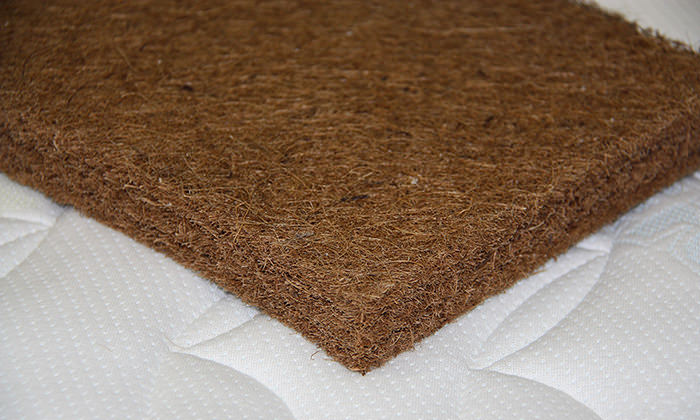
Structofiber (periotec)
It is made from synthetic polyester threads, sometimes with the addition of natural cotton, bamboo, wool, flax threads without the use of adhesives and resinous substances.
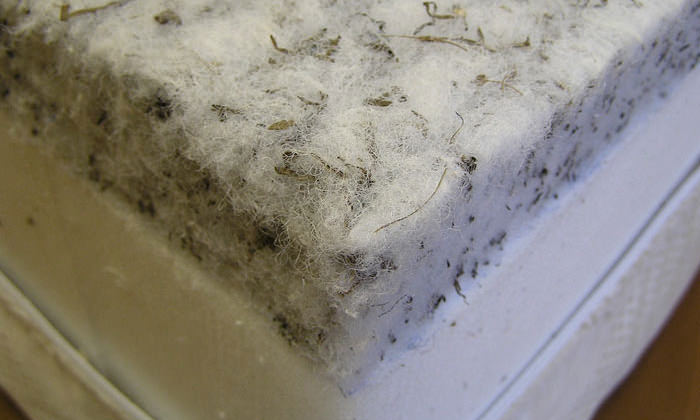
Holofiber
Made from polyester fiber. It has good indicators of air permeability, little caking, keeps its shape well.
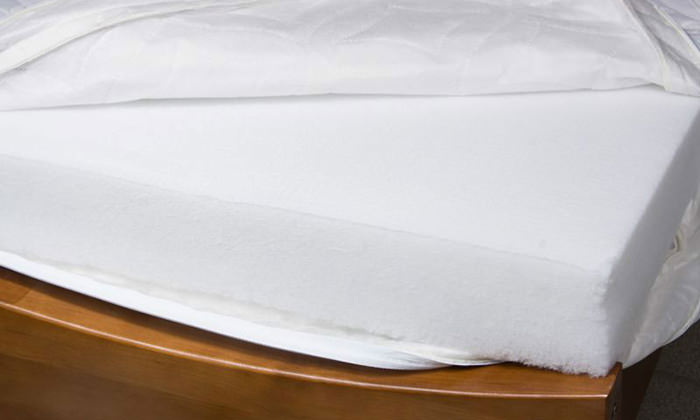
Technogel
It is similar in properties to memory foam, but has a gel-like structure. Due to this, it can distribute the load in all directions, which allows you to reduce the pressure on the body. The main disadvantage is the very high price.

Exotic natural fillers:
- Horsehair. An expensive material, considered one of the best fillers. Additionally impregnated with latex. Hard and semi-rigid mattresses with very good orthopedic support can be produced.
- Sisal. Obtained from the leaves of the Agava sisolana plant. Also subjected to additional impregnation with latex. Sisal is a tougher material than coir, but more durable.

Sizes of orthopedic mattresses
Manufacturers offer a wide range of standard sizes, among which you can choose a model for any bed. In addition, it is always possible to order a custom size, although it will cost a little more. The main difficulty is to decide what size mattress you need. Use the following tips when choosing a mattress:
- Measure your height and add at least 15 cm - the length of the mattress should not be less than the resulting value, but it is better if it is 5 cm longer.
- Lie on your back with your hands behind your head and measure the distance between your elbows. This is the width of the mattress you want. If you are sleeping together, then the same measurements should be taken for the partner. And again, provide a few centimeters "in reserve".
- Be sure to measure the size of your bedroom to get a good idea of the size of your mattress.
Standard mattress sizes
The most common and popular mattress models have the following sizes:
- width: 80, 90 cm (single), 120 cm (one-and-a-half), 140, 160, 180, 200 cm (double).
- length: 190, 195, 200 cm.
Choosing an orthopedic mattress in the store
And now, finally, you have decided which model you need. Now - to the store to test your solution in practice. Let's say you want a "medium firm" mattress. But different manufacturers have their own ideas about the degree of rigidity, their own materials, and, accordingly, different results. Therefore, tune in to the fact that you will have to lie on different mattresses, and the more models you try, the more correct the choice will be.
- To choose the right orthopedic mattress, you need to assess as accurately as possible how comfortable it is to lie on. This will be helped by loose clothing, familiar and comfortable for you.
- Go to the store in the morning on a weekend. After a working day, any sleeping place will seem very comfortable.
- Do not hurry! Each mattress must be given at least 10-15 minutes. Otherwise, you will not feel comfortable.
- Turn from side to side, then take your favorite sleeping position and lie down for a while - this will help to correctly assess comfort.
- Do you sleep in the same bed with your spouse? Go to the store together, arrange "sea trials" together.
- Springless mattresses seem softer if they lie on the base alone, not surrounded by a bed frame. They will seem more rigid if you put them in a frame. The effect is most pronounced for latex.
- The creak and "ringing" of the springs will indicate the low quality of the mattress.
Advice: The choice is best done in a large specialized store, where you can try many different models from different manufacturers at once. The disadvantage of such shopping centers is that the prices in them, as a rule, are unreasonably high. If you are not satisfied with the price, look for the model you like in the online store. As a rule, prices there are significantly lower with the same quality of goods.

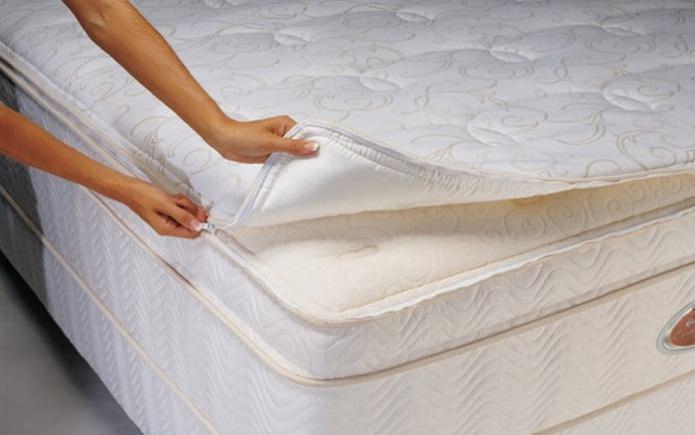
 10 practical tips for arranging a small kitchen in the country
10 practical tips for arranging a small kitchen in the country
 12 simple ideas for a small garden that will make it visually spacious
12 simple ideas for a small garden that will make it visually spacious
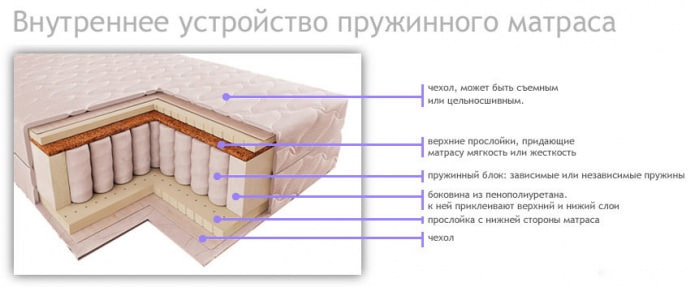
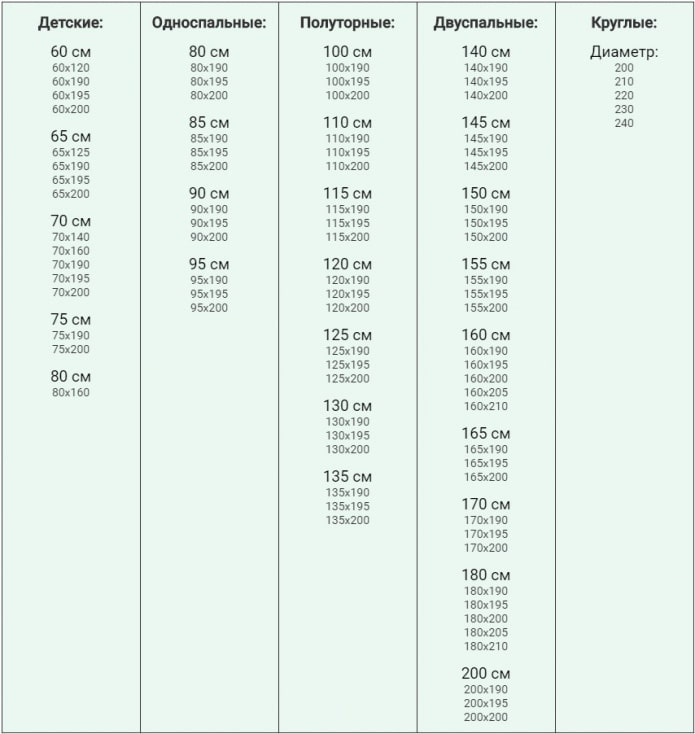

 Wall design in the bedroom: choice of colors, finishing options, 130 photos in the interior
Wall design in the bedroom: choice of colors, finishing options, 130 photos in the interior Bedroom design with gray wallpaper: 70 best photos in the interior
Bedroom design with gray wallpaper: 70 best photos in the interior Bedroom design in orange tones: design features, combinations, photos
Bedroom design in orange tones: design features, combinations, photos Stretch ceilings in the bedroom: 60 modern options, photo in the interior
Stretch ceilings in the bedroom: 60 modern options, photo in the interior Bedroom design for a girl: photos, design features
Bedroom design for a girl: photos, design features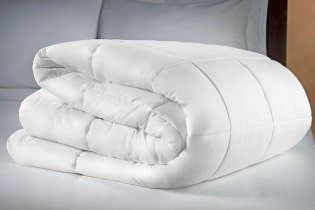 How to choose a blanket by filler?
How to choose a blanket by filler?